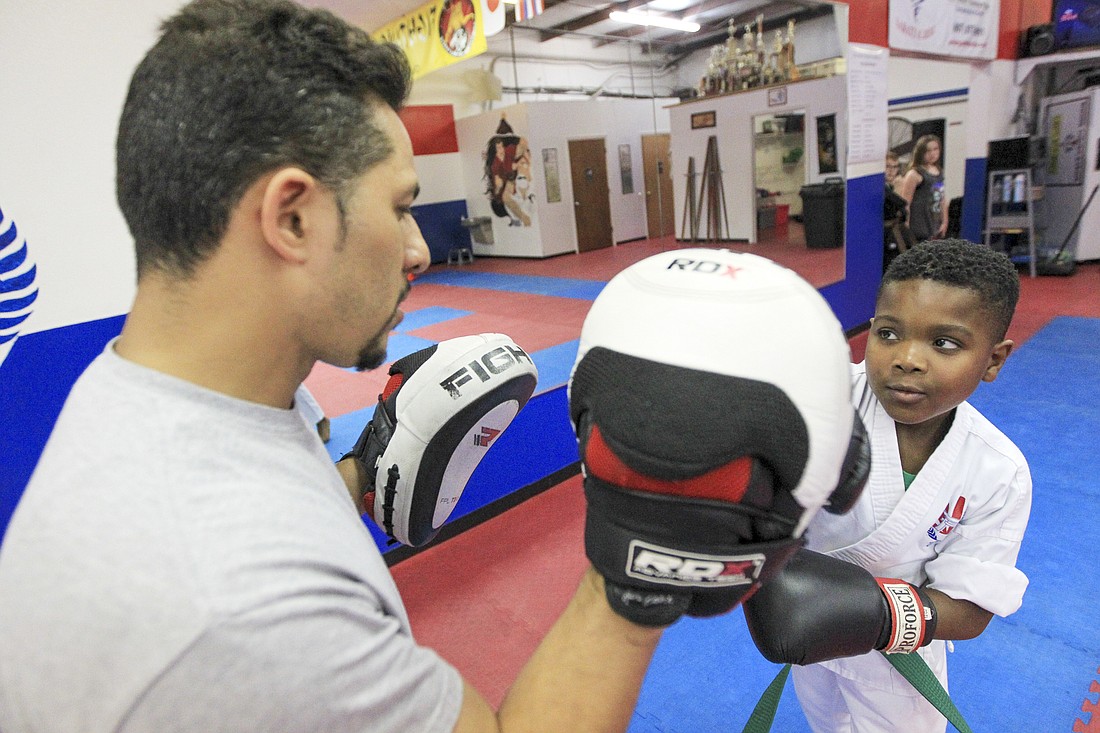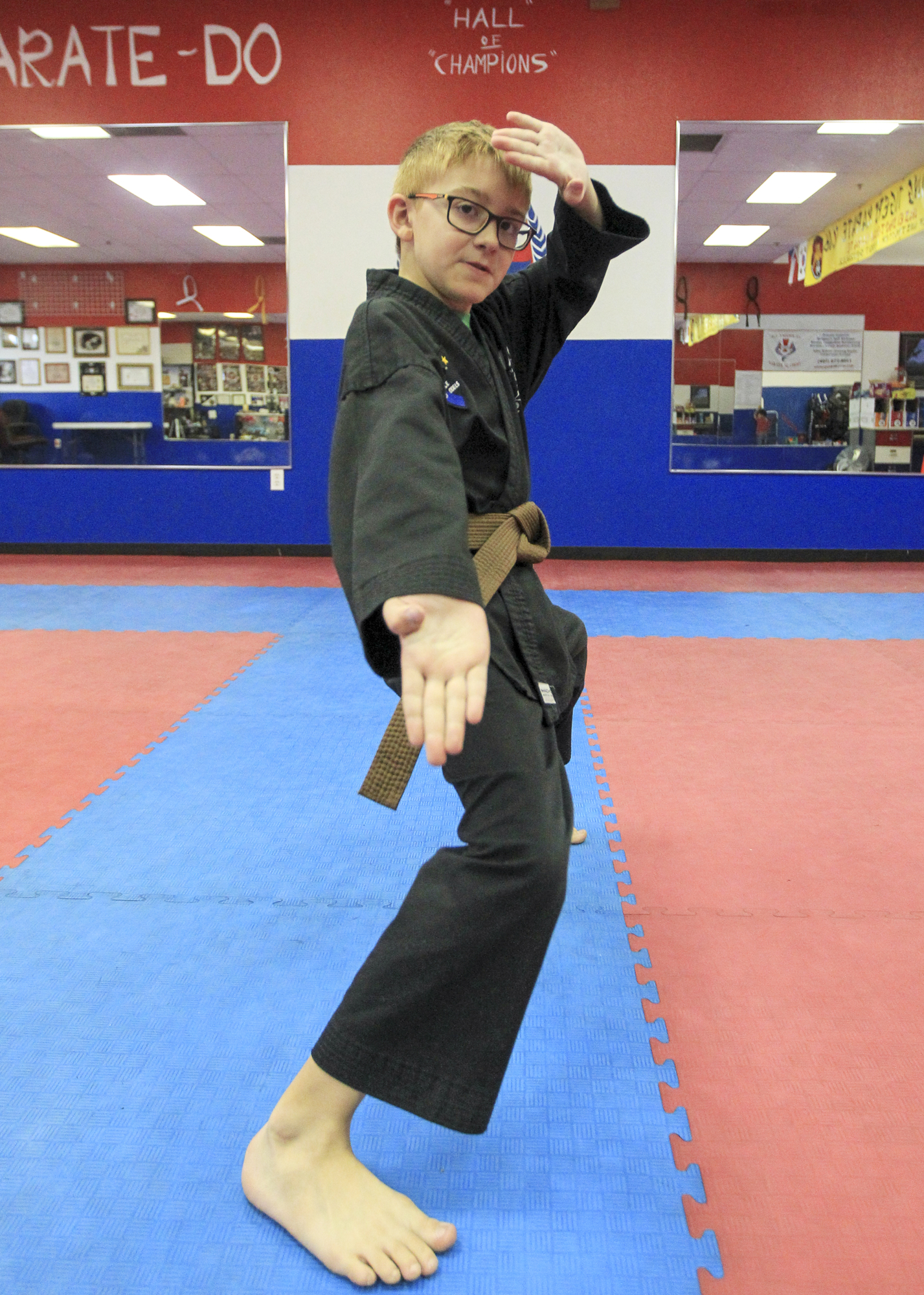- April 4, 2025
-
-
Loading

Standing at the center of the bright mats of Winter Garden Karate, 10-year-old Ashton Duguid-Petrakis takes his stance.
He briskly goes into his kata — a detailed choreographed exercise used by martial artists — and moves gracefully about the floor.
With each strike of the hand or foot, his white karate gi flows along, as the brown belt around his waist twirls about.
It’s this aspect of martial arts that Duguid-Petrakis loves the most — it allows him to better understand his technique.
“I personally like katas,” Duguid-Petrakis said. “It’s very fun to learn — it’s exciting. It’s like going from one strike or move to another move, and the fun part is just learning it and practicing. It also teaches you how to combine strikes and the purpose of them.”
As he watches from just off to the side, sensei Li Gonzalez takes notes and watches as the young Duguid-Petrakis works on his form.

The learning and development of these young martial artists is a big part of the reason why Gonzalez — a fourth-degree black belt and a sensei at the school — does what he does.
“I actually enjoy it, because it’s a day-by-day learning experience,” Gonzalez said. “I also like seeing the kids grow up — like I’ll see them when they first start (and think), ‘This kid can’t tell his left from his right,’ and all of a sudden it’s three years in and this kid is throwing head kicks and doing all of this crazy stuff. That’s pretty cool.”
This school, and its teaching, is a family tradition dedicated to helping kids — and adults — learn the ways of karate, and it’s why his father established the school 15 years ago.
Teaching alongside his sister, Yaidel, who is a black belt herself, and his father, Kermit — a seventh-degree black belt and the school’s shihan — is a continuation of a passion for karate that all started with his dad’s time in the military, which included teaching taekwondo.
That early influence led Gonzalez to pick up martial arts at the age of 5, and from there he just ran with it.
In the years since, he has developed and worked on his techniques and has spent the last 15 years teaching the students who come through the front door at Winter Garden Karate next to his family — which has been a lot of fun, Gonzalez said.
“It’s really nice, it really is,” Gonzalez said. “Every family is going to bump heads, but at the end of the day not a lot of people can be like, ‘Yeah, I work with my father and my sister.’”
The school itself offers up a range of classes for children as young as 4 years old, all the way up to adults. Gonzalez said that he currently has a student who is in his 60s actively participating.
It’s the kids’ classes, however, where Gonzalez and his family can really teach the fundamentals of self-discipline and respect that play such an important role in their martial art.
In reaching children at such a young age, it’s crucial to teach them how to handle themselves.
“This day and era, the way the world is, they understand what respect is and how to behave and be presentable in the public,” Gonzalez said. “I feel like that is going away, and I don’t know why. (I want to see them) carry their own and be confident.”
The structure that comes along with martial arts is a pretty big factor if you ask some of Gonzalez’s elite pupils, such as Duguid-Petrakis and 9-year-old Rickari Fox.
“I actually enjoy it, because it’s a day-by-day learning experience. I also like seeing the kids grow up."
— Li Gonzalez
For Fox, a green belt at the school, that discipline goes hand-in-hand with the sparring aspect of his training, which also happens to be his favorite part about karate.
“I came here to learn discipline,” Fox said. “I like learning how to fight — that’s why I like sparring — and it mostly helps you how to toughen up.”
A big part of the draw for the once shy Duguid-Petrakis was that it offered him a place to learn how to become a better person and develop mental strength.
“It taught me many things over the years — it taught me respect, discipline and how to be a good leader,” Duguid-Petrakis said.
The drive to better themselves, both mentally and technically, is something that can be seen when you watch these young students work in the dojo.
And while they all have different goals they set up for themselves, there’s one thing that unites them all — a fire to keep going and to get better.
“I want to be able to do this to where I no longer have enough time to — even if I don’t have enough time, I want to come here,” Duguid-Petrakis said. “I can’t say I want to go to a belt and just stop, I always want to go higher.”